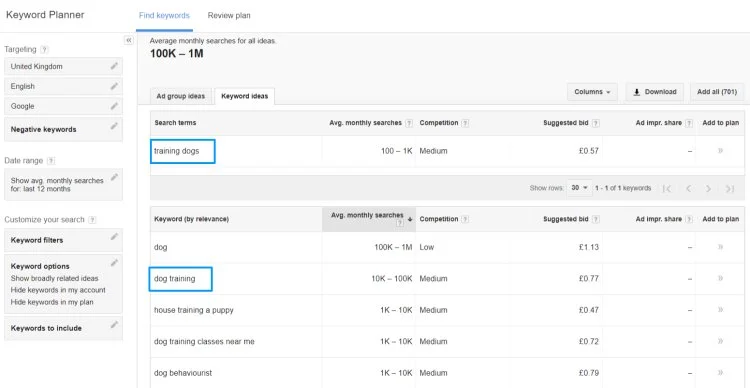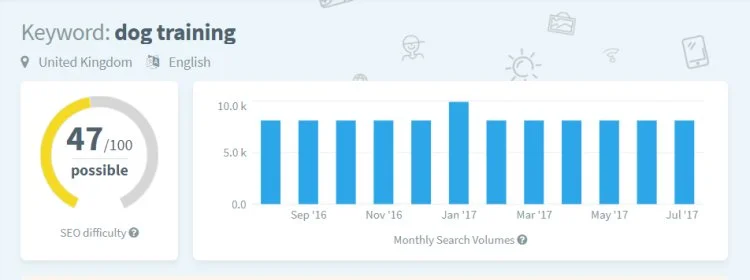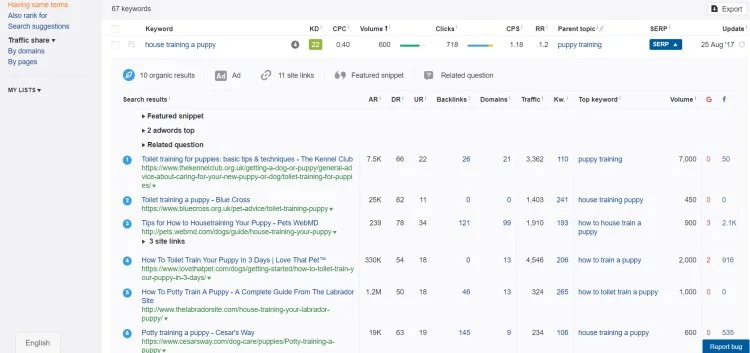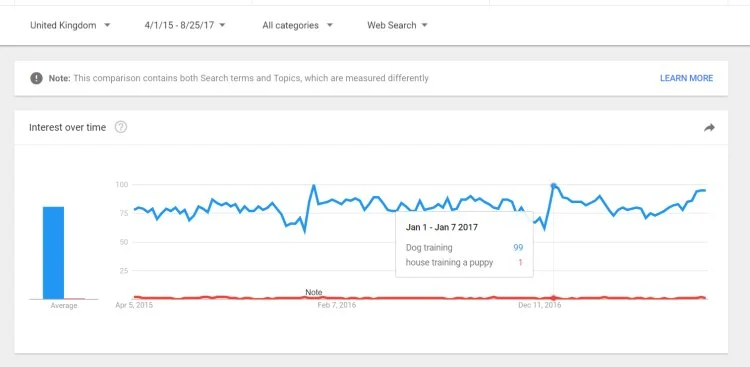Why Is Keyword Research So Important?

If your website achieves a high ranking for specific keywords, but you're not seeing the desired results, it's possible that you're not focusing on the right keywords.
You might be wondering if there's such a thing as 'good' keywords. Well, the answer is yes!
Occupying the top spot for search terms that are only searched for three times a month isn't very productive, is it? Therefore, conducting thorough keyword research is essential to identify the keywords you should prioritize.
If you remain skeptical about the significance of keyword research in today's SEO landscape, continue reading to understand why keyword research is crucial and how it can enhance your overall marketing strategy.
What is Keyword Research?
Keyword research involves a thorough exploration and fine-tuning process. Its primary goal is not just to uncover keywords relevant to your business and audience, but also to discover 'high-performing' keywords that will generate substantial traffic without facing excessive competition.
Why is Keyword Research So Important?
1. Find keywords with high search volume
I've been discussing the concept of 'effective' keywords, and one approach to define their effectiveness is by analyzing the frequency of people searching for a specific term. This is commonly gauged using the metric known as average monthly volume or AMV.
For example, let's consider an imaginary website that specializes in dog training and pet care. Our website might perform admirably for the keyword 'training dogs,' which garners 250 searches per month. However, when we contrast this with the term 'dog training,' which attracts 6,000 monthly searches, it becomes evident why conducting thorough keyword research is crucial.

The greater the number of individuals looking for a specific term, the higher the chances of your website gaining visibility. If your website performs favorably in search results for keywords with a significant search volume, it's probable that your site's traffic will experience a boost.
To evaluate the search volume for your keywords, you can employ AdWord's Keyword Planner tool. It's worth noting that while the tool is accessible for free, it will provide you with data ranges if you haven't yet exceeded a certain spending threshold for AdWord (PPC) campaigns.
2. Find keywords with low competition
When conducting keyword research, it's crucial to evaluate the extent of competition. When utilizing Google Keyword Planner, competition is gauged by examining "the number of advertisers that appeared for each keyword in comparison to all keywords across Google." This metric is tailored to the specific geographic location and Search Network settings you've chosen, and it classifies competition as either low, medium, or high. While the competition level for each keyword is primarily determined by the quantity of advertisers competing for those keywords, it can also serve as a reliable indicator of the overall competitiveness, meaning the number of websites targeting those specific keywords. The goal is to identify keywords that have either medium or low levels of competition.

3. Assess the difficulty to rank
While checking the competitiveness of a keyword using Google Keyword Planner (GKP) can provide a quick glimpse into the landscape, it doesn't offer a comprehensive view. Targeting keywords would be futile if your website's chances of ranking highly for them are close to impossible, which is commonly referred to as keyword or SEO difficulty.
KWFinder, on the other hand, quantifies this as SEO difficulty and assesses it based on several SEO factors associated with the websites currently ranking for those keywords:
-
Authority & Trust: The extent of topical authority and trust that your domain and pages have accumulated plays a significant role in determining your rankings in Google's search results.
-
Backlinks: The quantity of external links directing link juice to that site (excluding links with the nofollow attribute).
-
Facebook Shares: The number of times the URL targeting the same keyword has been shared on Facebook.

Keywords rated 0-9 in terms of difficulty are considered easy, while those with a rating of 50 or higher are categorized as challenging or nearly impossible. In essence, if you come across keywords that are already being pursued by authoritative domains with significant traffic, such as Wiki or Amazon, we suggest selecting less competitive keywords.
4. Understand what you're competing against
When evaluating keyword competitiveness, it can be valuable to analyze the composition of search engine results pages (SERPs). Much like KWFinder, Ahrefs' keyword tool assesses keyword difficulty by considering factors such as Domain Rank, Page or URL Rank, and backlinks. However, Ahrefs offers an additional feature where you can also observe the types of results present in SERPs.
For the query 'house training a puppy,' it's evident that there is a featured snippet, two AdWords listings, and a related question that precede all the organic search results.

Keyword research simplifies the process of determining whether it's worthwhile to focus on a particular keyword. If your website is destined to show up halfway down Google's first page, even when it should be at the top, is it really worth the effort? Ahrefs can assist in making this assessment more straightforward. Additionally, I'd like to emphasize that if a keyword has low difficulty, a moderate search volume, and faces minimal competition, it's a valuable pursuit. This is because organic search results typically enjoy a high level of trust from users.
5. Find keywords with high conversion rates
Keyword difficulty can also serve as an indicator that a keyword might be too broad in scope. Generally, the shorter a keyword is, the more challenging it becomes to rank for, as it faces higher competition. These shorter keywords are often referred to as "head" keywords.
Head Keywords: These are typically composed of 1-2 words, encompassing broad concepts, boasting a significant monthly search volume, but also facing high competition and keyword difficulty.
Long tail keywords: Comprising 3 or more words, these keywords are more specific in nature, leading to a higher conversion rate and click-through rate (CTR). The advantages of discovering long tail keywords are as follows:
-
Reduced competition: Long tail keywords should be tailored to the particular services and products you provide, resulting in decreased competition.
-
Enhanced targeting: When your long tail keywords are highly specific, they have a greater potential to attract the right visitors. The more accurately a phrase describes something, the more relevant it will be to your website's visitors.
-
Meeting search intent: Long tail keywords excel in fulfilling search intent and can thus draw highly relevant traffic to your site.
6. Scope the competition
When I begin my keyword research for clients, one of my initial steps involves examining their competitors. This competitive analysis helps me gain a deeper comprehension of the keywords their rivals are prioritizing. This, in turn, aids in understanding the target audience and the nature of their offerings.
Additionally, scrutinizing their chosen keywords provides valuable insights into their overall strategy and may offer clues about the type of content they're producing. Utilize this knowledge to shape your own content strategy. Rather than merely mimicking their approach, strive to enhance or modernize the information they've provided, or use it as a source of inspiration for your original content ideas.
7. Get ideas for your content strategy
Engaging in keyword research can serve as a source of inspiration for generating excellent content ideas. When focusing on optimizing your landing pages, it's important not to overlook keywords that may not seem directly relevant. Instead, make a note of valuable keywords you encounter and leverage them to formulate a content strategy.
8. Find new keywords
While this may appear obvious, it can sometimes be challenging to determine the search terms your audience employs. If you're drawing a blank or working on an unfamiliar website, conducting keyword research can be a valuable method for brainstorming. There are a couple of approaches to achieve this:
-
Utilize your own website: Examine your products and services and utilize them as starting keywords. Input these into your preferred keyword tool to generate a list of related search terms. Google's Keyword tool can even group AdWords suggestions, making it simple.
-
Explore your competitors' websites: Alternatively, you can enter your competitors' website URLs to discover the search terms they use.
Once you've compiled a list of ideas, you can start refining it by eliminating keywords with low monthly search volume and high competition.
9. Understand trends
Knowing when individuals are looking for specific keywords is valuable for deciding the optimal timing to release a blog post or refresh your website. Utilize Google trends to gain insights into the periods of high interest.

As expected, the search interest for this particular term reaches its highest point shortly after the Christmas season. This is likely because it's the time of year when people are most inclined to gift dogs to their loved ones. Utilize this insight to formulate a strategy for content publication or website adjustments.
Finishing Up
Keyword research goes beyond simply identifying words your audience might search for. It's primarily about discovering high-quality keywords that can significantly enhance your website's performance.
If the keywords you're currently using aren't driving more traffic or improving conversions (consider incorporating long-tail search terms), it might be wise to engage in more thorough keyword research. In doing so, you could also uncover insights about your competitors and stumble upon valuable content ideas.
Bear in mind that while keyword research remains crucial, optimizing your on-page content for these chosen keywords is equally important. To ensure success, refer to our guide on effectively implementing your keywords.
What's Your Reaction?

































